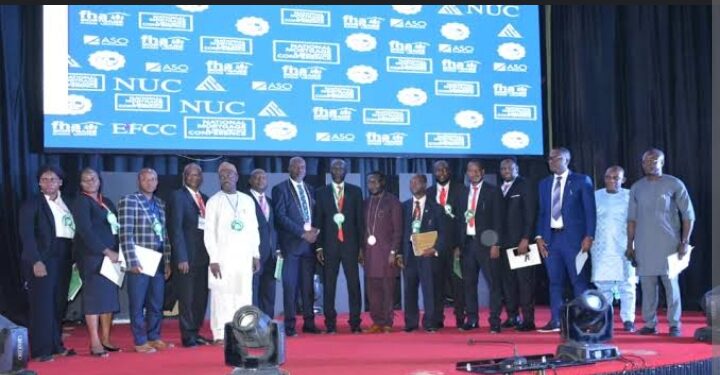The Institute of Mortgage Brokers and Lenders in Nigeria (IMBLN) has inducted new fellows and Chartered members.
The new inductees comprising three fellows and nine Chartered members were inducted during the Mortgage/Real Estate Conference held at National Merit House, Abuja.
Registrar of the institute, Mr. Jasper Adeleye charged the new inductees to be go ambassador of the institute and uphold professional ethics/guidelines principles they were exposed to during their trainings.
Speaking on housing deficit, he said the Nigeria is yet to explore huge business potential in Mortgage industry.
Adeleye noted Mortgage Industry is contributing less than five percent to Nigeria’s GDP due to activities of fraudulent, unlicensed and quack mortgage brokers, lenders and developers operating activities the country.
“Mortgage Industry should be contributing reasonable percentage to Gross Domestic Product (GDP) of Nigeria, if it is well regulated. This sector has the potential to add over 10 percent from less than one percent contribution according to available data. Institute of Mortgage Brokers and Lenders will change the narrative.
“We are currently engaging stakeholders in mortgage industry to eliminate fraudulent, unlicensed and quack mortgage brokers, lenders and developers exploiting as well as defrauding innocent Nigeria. We will flush them out by working with relevant security agencies and other stakeholders to implement provision of IMBL Act,” he said.
He said the institute is a regulatory body to promote professionalism, ethics, and best practices within the mortgage brokering and lending sector as contained in establishment ACT signed by former President Muhammadu Buhari in 2022.
Meanwhile, the Economic and Financial Crimes Commission (EFCC) at the event, promised to partner with the IMBLN to get rid of fraudulent, unlicensed and quack in mortgage industry.
The Director, Special Control Unit Against Money Laundering (SCUML) of the commission, Daniel Isei, observed that many fraudulent people use real estate to cover their shady deals, safeguard illicit wealth and get huge return on investment.
He said some fraudulent people in this country invest in real estate to keep illicit wealth without trace by anti-graft agencies.
“They are able do this because the sector has not been regulated. Some Practitioners don’t comply with provisions of law regarding cash deposit and foreign currency transactions.
While responding to request to make certification of IMBLN compulsory for SCUML registration, Isei said, “We are ready to partner with Institute of Mortgage Brokers and Lenders in Nigeria. We have received four correspondences from the Institute and the commission will work with them to sanitize Mortgage industry.”
In his remarks, the Managing Director/Chief Executive Officer Federal Mortgage Bank, Madu Hamman, said President Bola Tinubu has given directive for Mortgage Bank, Microfinance and Housing financial institutions to collaborate with the view of facilitating access to mortgage financing for potential home buyers.
Also, an academic, Prof Uche Uwaleke, advised the institute to collaborate with the Association of Vice Chancellors and National University Commission (NUC) to mount Mortgage Studies at Postgraduate level.











